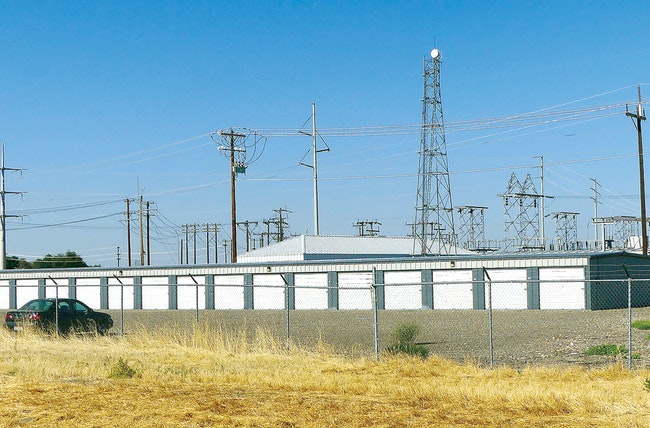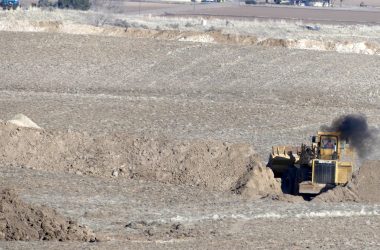
Officials planned to convert the old Wonka Mini Storage next to an Idaho Power substation in Ontario into a bitcoin mine, but the plan is on hold for now. (The Enterprise/Joe Siess)
ONTARIO – Plans by an Idaho real estate development firm to launch a bitcoin mining operation in a storage facility north of Ontario are on hold.
Paul Knudson, the chief operating officer for XTRA Bitcoin Inc., said the rising cost in power prompted his firm to look elsewhere to create the mining operation. Knudson also owns Pines Townhomes LLC, a Fruitland real estate company that owns the storage facility.
Knudson said negotiations with Idaho Power did not prove as fruitful as he hoped.
“Idaho Power quoted me a certain price and when they came out to Ontario to do a presentation the price went up 50 percent from what I was quoted,” said Knudson.
Knudson said he then began to look for another location.
“We bought a facility up in Canada and are developing that at the moment. Canada has cheaper power,” said Knudson.
Bitcoin is a cryptocurrency – a digital asset used as a medium of exchange – created in 2009 that does not depend on a central bank and can be sent from one computer user to another.
A bitcoin mining operation is essentially a large computer server farm. The mining is the process where bitcoin transactions are validated. Because they are so large – with hundreds of servers operating 24 hours a day – bitcoin mines are large power consumers.
Knudson said XTRA Bitcoin still owns the Ontario storage building.
“We will use it as a staging facility as we gather up machines until we have a better price hosting site to send it to. We are reserving the site for its use, but it does not appear it is economically viable as a stand-alone for the long-term,” said Knudson.
Interest in bitcoin has fluctuated but in 2017 there was a large spike in the value of a single bitcoin from $1,000 to over $19,000. That spike triggered a bitcoin boom in central Washington, an area known for its cheap hydroelectric power.
Places like Chelan, Wash., near the Columbia River then became the go-to location for bitcoin server farms.
The boom, though, put stress on the area’s power grid. In 2018 in Chelan, for example, the city established a moratorium on new crypto-mining operations because of the impacts on the local power grid.
Adjustments of the power grid are occurring in specific areas across the U.S. and Canada to make way for bitcoin mines, said Knudson.
“As the industry develops, large capacity, cheap power is being developed at hosting sites,” said Knudson.
News tip? Contact reporter Pat Caldwell at [email protected].
Previous coverage:
Power grid braces as cryptomining comes to Ontario
SAFEGUARD YOUR LOCAL NEWS
Take one action today to help the Enterprise grow and do more for the community through accurate, fair reporting.
SUBSCRIBE: A monthly digital subscription is $5 a month.
GIFT: Give someone you know a subscription.
ONE-TIME PAYMENT: Contribute, knowing your support goes towards more local journalism you can trust.




